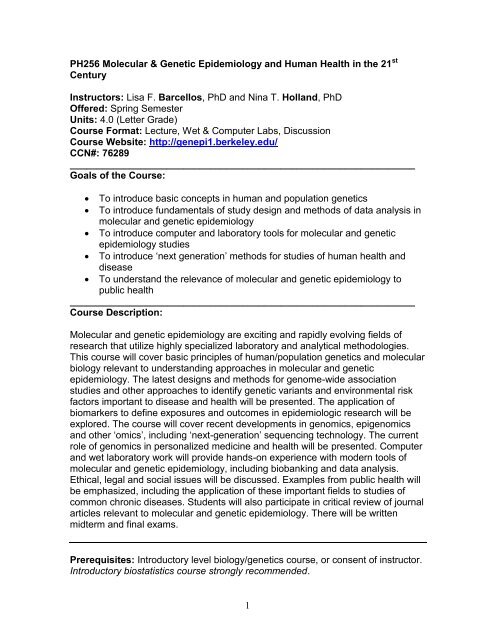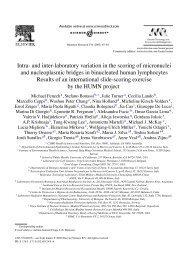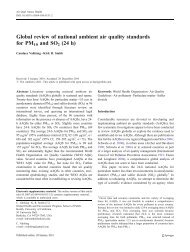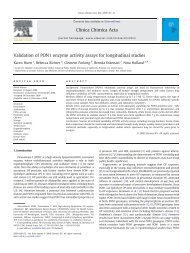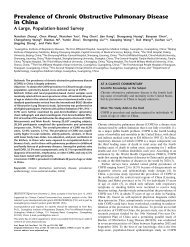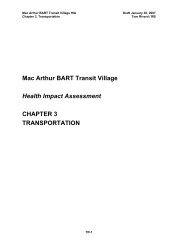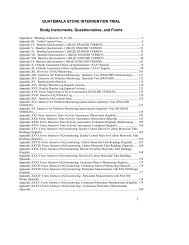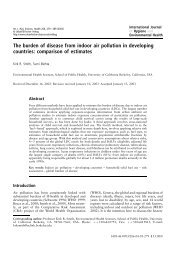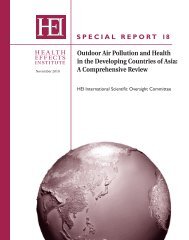Syllabus - Environmental Health Sciences, UC Berkeley, School of ...
Syllabus - Environmental Health Sciences, UC Berkeley, School of ...
Syllabus - Environmental Health Sciences, UC Berkeley, School of ...
You also want an ePaper? Increase the reach of your titles
YUMPU automatically turns print PDFs into web optimized ePapers that Google loves.
PH256 Molecular & Genetic Epidemiology and Human <strong>Health</strong> in the 21 st<br />
Century<br />
Instructors: Lisa F. Barcellos, PhD and Nina T. Holland, PhD<br />
Offered: Spring Semester<br />
Units: 4.0 (Letter Grade)<br />
Course Format: Lecture, Wet & Computer Labs, Discussion<br />
Course Website: http://genepi1.berkeley.edu/<br />
CCN#: 76289<br />
________________________________________________________________<br />
Goals <strong>of</strong> the Course:<br />
<br />
<br />
<br />
<br />
<br />
To introduce basic concepts in human and population genetics<br />
To introduce fundamentals <strong>of</strong> study design and methods <strong>of</strong> data analysis in<br />
molecular and genetic epidemiology<br />
To introduce computer and laboratory tools for molecular and genetic<br />
epidemiology studies<br />
To introduce ‘next generation’ methods for studies <strong>of</strong> human health and<br />
disease<br />
To understand the relevance <strong>of</strong> molecular and genetic epidemiology to<br />
public health<br />
________________________________________________________________<br />
Course Description:<br />
Molecular and genetic epidemiology are exciting and rapidly evolving fields <strong>of</strong><br />
research that utilize highly specialized laboratory and analytical methodologies.<br />
This course will cover basic principles <strong>of</strong> human/population genetics and molecular<br />
biology relevant to understanding approaches in molecular and genetic<br />
epidemiology. The latest designs and methods for genome-wide association<br />
studies and other approaches to identify genetic variants and environmental risk<br />
factors important to disease and health will be presented. The application <strong>of</strong><br />
biomarkers to define exposures and outcomes in epidemiologic research will be<br />
explored. The course will cover recent developments in genomics, epigenomics<br />
and other ‘omics’, including ‘next-generation’ sequencing technology. The current<br />
role <strong>of</strong> genomics in personalized medicine and health will be presented. Computer<br />
and wet laboratory work will provide hands-on experience with modern tools <strong>of</strong><br />
molecular and genetic epidemiology, including biobanking and data analysis.<br />
Ethical, legal and social issues will be discussed. Examples from public health will<br />
be emphasized, including the application <strong>of</strong> these important fields to studies <strong>of</strong><br />
common chronic diseases. Students will also participate in critical review <strong>of</strong> journal<br />
articles relevant to molecular and genetic epidemiology. There will be written<br />
midterm and final exams.<br />
Prerequisites: Introductory level biology/genetics course, or consent <strong>of</strong> instructor.<br />
Introductory biostatistics course strongly recommended.<br />
1
SPRING 2012 <strong>Syllabus</strong><br />
Date Subject Instructor (s) Location<br />
1/19 -Overview <strong>of</strong> Course<br />
-People and Ideas in Human Genetics and Molecular Biology<br />
-Introduction to Genetic Epidemiology and Study Designs<br />
1/26 -Concepts in Population Genetics<br />
-Computer Lab: Pypop and Haploview<br />
2/2 -Linkage Analysis: The Past, Present and Future<br />
-Journal Club #1<br />
2/9 -Homework #1 due (Population Genetics)<br />
-Disease Association Studies: I<br />
-Computer Lab: AFBAC and Haploview<br />
L. Barcellos 2030 Valley<br />
LSB<br />
L. Barcellos 340A<br />
Haviland<br />
L. Barcellos 2030 Valley<br />
LSB<br />
L. Barcellos 340A<br />
Haviland<br />
2/16 -Disease Association Studies: II<br />
-Computer Lab: Haploview and PLINK<br />
2/23 -Homework #2 due (Linkage and Association)<br />
-Pharmacogenomics<br />
-Epigenomics and Human <strong>Health</strong> & Disease<br />
3/1 -Disease Association Studies: III<br />
-Computer Lab: Program Review<br />
-Journal Club #2<br />
3/8 -Homework #3 due (Imputation and GxE)<br />
-Approaches to Analysis <strong>of</strong> DNA Methylation Data<br />
-Methods for Multiple Testing Issues in Genetic Studies<br />
*HANDOUT MIDTERM EXAM*<br />
L. Barcellos<br />
F. Briggs<br />
D. Johnson<br />
N. Holland<br />
L. Barcellos<br />
F. Briggs<br />
E. Elboudwarej<br />
B. Goldstein<br />
L. Barcellos<br />
340A<br />
Haviland<br />
2030 Valley<br />
LSB<br />
340A<br />
Haviland<br />
2030 Valley<br />
LSB<br />
3/15 -Molecular Epidemiology: Biomarkers as a Tool<br />
-Research Involving Human Subjects and Ethical Issues<br />
-Wet Lab: Sample Collection for DNA extraction<br />
N. Holland 2030 Valley<br />
LSB<br />
*MIDTERM DUE*<br />
3/22 -Homework #4 due (Human Subjects Training)<br />
-Methods for Detecting Admixture and Population Stratification<br />
-Computer Lab: STR<strong>UC</strong>TURE/PLINK<br />
*MIDTERM RESULTS*<br />
3/29 SPRING BREAK<br />
F. Briggs<br />
L. Barcellos<br />
340A<br />
Haviland<br />
4/5 -Specimen Banks and Biorepositories<br />
-Wet Lab: DNA quantification, Cell cultures and Biospecimen<br />
Banking<br />
N. Holland 112 RFS<br />
2
4/12 -Biomonitoring: From Lead to Exposome<br />
-Omics: Transcriptomics and Proteomics<br />
-Journal Club #3<br />
4/19 -Homework #5 due (Biomarkers and Biomonitoring)<br />
-Novel Methods <strong>of</strong> Molecular Cytogenetics<br />
-Wet Lab: Methods <strong>of</strong> Cytogenetic Analyses<br />
4/26 -Next Generation Sequencing and Genomics in Personalized<br />
Medicine<br />
-Computer Lab: Introduction to Bioinformatics Tools<br />
N. Holland 2030 Valley<br />
LSB<br />
N. Holland 210<br />
Hildebrand<br />
L. Barcellos 340A<br />
Haviland<br />
*Hand out take-home portion <strong>of</strong> the Final Exam: Lab<br />
exercises using STR<strong>UC</strong>TURE, PLINK and Bioinformatics<br />
Tools. This will be due on 5/10 – day <strong>of</strong> in class FINAL<br />
EXAM.<br />
5/3 -RRR Week (OPEN COMPUTER LAB FOR QUESTIONS)<br />
5/10 FINAL EXAM (IN CLASS) 12.30-3.30 PM L. Barcellos<br />
N. Holland<br />
Location TBD<br />
Grading:<br />
Attendance & participation (Journal Club, Office Hours): 10%<br />
Midterm (written take-home) examination: 30%<br />
Final (comprehensive, in-class) examination: 40%<br />
Homework (five assignments) 20%<br />
Instructor contact information:<br />
Pr<strong>of</strong>essor: Nina T. Holland, 510.455.0561, 510.642.8781, 733 University Hall<br />
e-mail: ninah@berkeley.edu<br />
Office Hours: by appointment<br />
Pr<strong>of</strong>essor: Lisa F. Barcellos, 510.642.7814, 231 Hildebrand Hall<br />
e-mail: lbarcellos@genepi.berkeley.edu (preferred communication)<br />
Office Hours: by appointment<br />
Graduate Student Instructor: Vitaly Volberg (PhD student)<br />
e-mail: vvolberg@berkeley.edu<br />
Office Hours: Tuesdays 2-3:30 p.m. and Thursdays 12:30-2 p.m.<br />
Office Location: 34D University Hall (Ground Floor)<br />
Phone: 510.665.2200 (Lab)<br />
Office Hours: Students are required to attend one <strong>of</strong>fice hour (10 minute<br />
appointment) by/before the 4 th week <strong>of</strong> semester with Dr. Holland and Dr.<br />
Barcellos. Dates and times for sign-up will be given in first class meeting.<br />
3
Homework assignments: These will be posted on Course Website and<br />
distributed by email one week before due date, and are due before class begins<br />
on dates listed in syllabus. Assignments should be emailed directly to Drs. Holland<br />
and Barcellos at addresses listed above. Last name must be included in file name<br />
as shown: (NAME_PH256_Homework1_2012.doc or .pdf). In addition, First and<br />
Last name should be included in header <strong>of</strong> document. There will be a place for you<br />
to insert this information in each homework assignment.<br />
Location: This course will meet on Thursdays 2-5 p.m. in 2030 Valley LSB and/or<br />
340A Haviland Hall (Computer labs and lectures). One wet lab will be held in 210<br />
Hildebrand Hall, and another one at 112 Richmond Field Station (RFS).<br />
Recommended Texts for PH256:<br />
Strongly Recommended:<br />
Human Molecular Genetics, 4th Edition, T. Strachan & A.P. Read, eds. (2010)<br />
Wiley-Liss. ISBN-10: 0815341490<br />
Human Genetics, 7 th Edition, R. Lewis (2007) McGraw-Hill. ISBN 0073101435<br />
Molecular Epidemiology <strong>of</strong> Chronic Diseases, C.Wild, P.Vineis, S.Garte eds.<br />
(2008) Wiley. ISBN 978047-027431<br />
Human Biomonitoring for <strong>Environmental</strong> Chemicals, NTC (2006) available free on<br />
line at: http://www.nap.edu/catalog.phprecord_id=11700<br />
Additional Suggestions:<br />
An Introduction to Genetic Epidemiology (<strong>Health</strong> & Society Series)<br />
(2011) eds. L. Palmer, P. Burton, and G.D Smith. Policy Press; ISBN-<br />
10:1861348983<br />
Human Genome Epidemiology: Building the Evidence for Using Genetic<br />
Information to Improve <strong>Health</strong> and Prevent Disease (2009) eds. M. Khoury, S.R.<br />
Bedrosian, M. Gwinn, J.P.T. Higgins, and J.P.A. Ioannidis. Oxford University<br />
Press; 2 edition. ISBN-10:0195398440<br />
Genomic and Personalized Medicine, Volumes 1-2 (2008); Edited by H.F. Willard<br />
and G.S. Ginsburg; ISBN-10:0123694205<br />
A Statistical Approach to Genetic Epidemiology: Concepts and Applications,<br />
Ziegler and Konig, eds. (2006) Wiley-VCH; ISBN-13:978-3-527-31252-8<br />
4
Principles <strong>of</strong> Population Genetics, 4th Edition, D. Hartl & A. Clark (2006) Sinauer<br />
Associates, Inc. ISBN-10:0878933085<br />
Approaches to Gene Mapping in Complex Human Disease, 2 nd Edition, J.L.<br />
Haines & M. A. Pericak-Vance, eds.(2006) Wiley-Liss. ISBN 0471089524<br />
5


